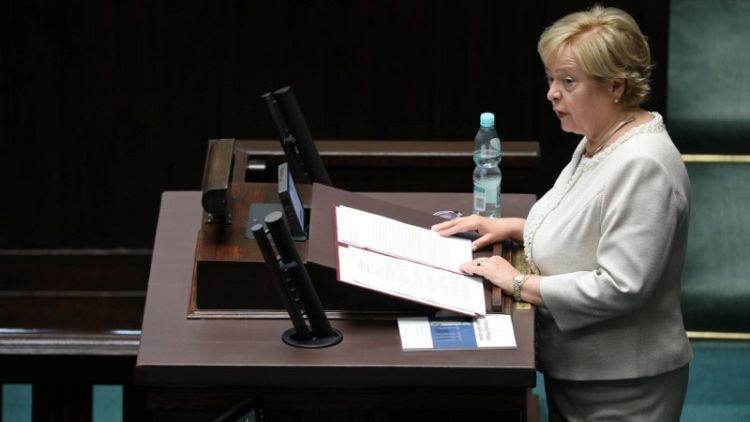WARSAW (Reuters) - Malgorzata Gersdorf, who the Polish government says is now retired but who insists her term as the Supreme Court head runs until 2020, walked into the court on Wednesday saying the situation was "very tense and dramatic".
Gersdorf is now at the heart of a rule of law dispute in Poland, the largest ex-communist member of the European Union.
She defied new government laws that the ruling nationalists say mean she has been dismissed and has no power to make decisions at the court, which validates elections in Poland.
Opposition parties, most constitutional experts and the EU's executive European Commission say Warsaw's efforts to push her out amount to unacceptable political meddling that undermines the independence of the judiciary, a basic democratic standard.
Since winning elections in late 2015, the ruling Law and Justice (PiS) party has tightened rules around media, courts and non-governmental groups and stands accused of undercutting key institutions in a democratic state.
Gersdorf told journalists on entering the building that she was coming to work to keep an eye on the Polish parliament, which is due to debate on Thursday the latest government amendments to the Supreme Court laws.
They are aimed at appointing the new head of the Supreme Court swiftly. Gersdorf said she had a negative view of the law.
"I am not fighting for my own interest, my position or to be left in peace. Had I wanted to be left in peace, I would have long given up this post," said the defiant judge.
"I am fighting for the country, for the rule of law, for preserving the constitution."
Through a raft of hastily-approved new laws, PiS has dismissed many judges in the country's Constitutional Tribunal, the National Judiciary Council and many regular courts. New ones have been appointed by the president, a PiS ally, under revamped procedures that give the parliamentary majority more say.
Despite street protests and EU pressure, the overhaul has also given the justice minister more powers to name and dismiss judges. Critics decry the changes as rolling back democratic standards 30 years after Poland overthrew communism.
The EU has launched several legal cases, as well as an unprecedented rule of law probe against Warsaw, which risks losing billions of euros in funding from the bloc.
The Polish government has offered only cosmetic concessions and says the judicial overhaul is needed to improve the efficiency of the courts and to rid the country of a lingering communist residue.
"According to the law, Madame Gersdorf is a retired Supreme Court judge. According to law, all decisions she could make are invalid," a senior PiS lawmaker, Marek Ast, told Reuters before the parliament session.
The stand-off around the courts splits Poland's 38 million people and damages the country's reputation abroad. Constitution expert Marek Chmaj said it risks undermining legal order, as the chaos creates grounds for challenges to court rulings.
"This will be a big problem. Someone can challenge regular cases of people considered by the courts, including the Supreme Court. They can be rerun in the future," he said.
(Reporting by Gabriela Baczynska, Pawel Sobczak and Anna Wlodarczak, Writing by Gabriela Baczynska, Editing by William Maclean)


